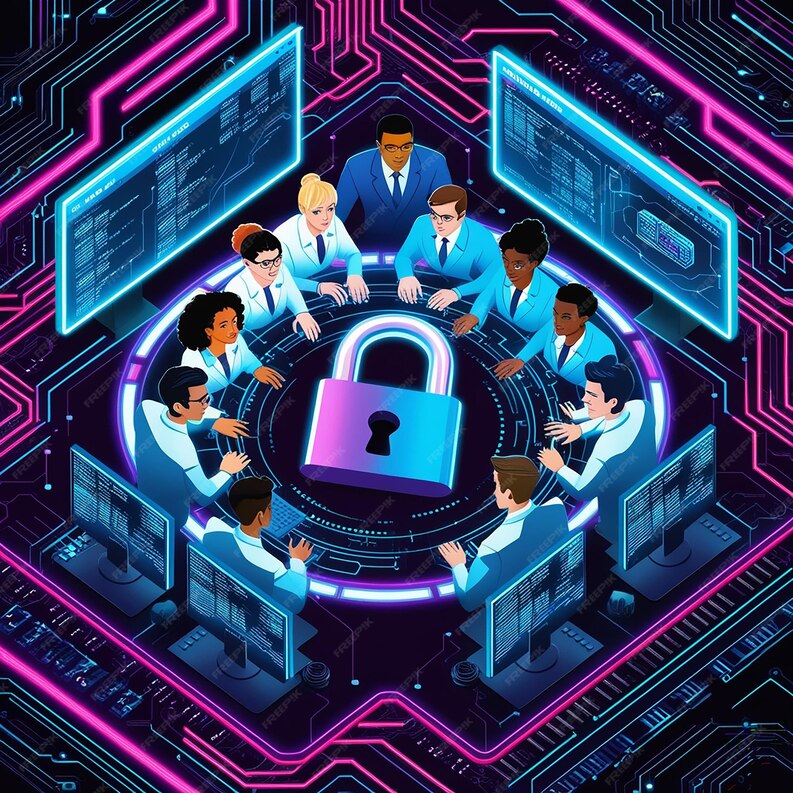Being a business owner means you are in a non-stop rush on every path of the road. With the daily hustle, you might wonder, “CyberSecurity? Do we really need it? We are a small business that a hacker targets.” But the truth is this: Hackers try to target these types of startups/small businesses that have just landed in the market pool. Cybersecurity for small businesses is an important factor in the modern market pool.
Now you might say: Why us? The answer is that hackers know that you need more experience and expertise to defend your firewall in comparison to big businesses. A small data breach can make your dream business come crashing down, leading to ruining your reputation in the market and screwing up your business operation for the future. We recommend you get help from it services for small businesses like Computero.
But the good news is this: Smart and carefully driven steps, including IT Managed Services for Cybersecurity, can protect your business against these dangerous threats without even losing a single amount of data. But getting strong on the cybersecurity front doesn’t mean breaking the bank for it or hiring a foolproof IT army. So, in this blog, we will be touching upon these pain points and will also highlight how you can protect your newly established small business from hackers by taking the services of cybersecurity companies for small businesses.
Fundamentals: Cybersecurity For Small Businesses
The Internet offers many opportunities for small businesses, but at the same time, it comes with a price. Having an extensive knowledge of small cybersecurity threats is the first nail in the coffin for defending cybersecurity small businesses.
Learning what you’re up against is a good place to start—whether it’s ransomware that holds hostage your data, pharming in cyber security, where spammers try to lure you to a fake website through a legitimate website, or phishing scams that trick you into giving your sensitive information.
Why Are Small Businesses Vulnerable To Cyber Attacks?
It’s not about the size of your business; small businesses face higher cyber attack risks due to the following factors:
Limited Resources: Compared with large organizations, small businesses do not have a large IT security team, which leaves a gap in their digital defense.
Employee Oversights: A click on an anonymous link will open the portal for hackers.
Changing AI-Enabled Threats: Cyberattackers can now use AI tools to execute their attacks and find new weaknesses in your system. Small businesses lack the defense technology to counter these types of attacks, which makes them more vulnerable.
Creating a Powerful Foundation for Cybersecurity Small Business
Laying a strong foundation for your small business requires taking some risky steps to build a strong digital presence in front of cyber attackers. This establishment is made upon the combination of various practices and tools that can boost your cybersecurity image.
AI enables a growing cyber threat landscape, but it also nurtures a very powerful defense system. AI-powered security systems learn and adapt, as well as detect emerging threats and vulnerabilities that standard methods might miss. Below are some examples of the same:
Power of Password & Updates: The founding stone for cybersecurity begins here. Generate a strong, unique password for each account and update your software on a regular basis. Opt for a password manager to securely store your password, which will eliminate the risk of reusing passwords on different platforms. You can use the security key app and activate the 2FA to make it more secure. Make sure that all the software is up-to-date so that there is no loophole for hackers to gain entry into your system.
Device Security (Antivirus): The last line is the most important factor of your business. The antivirus will scan for and neutralize cyber threats such as ransomware before they infect your computer. A free antivirus will provide you with the most basic protection, but we recommend that you purchase a certified antivirus.
Network Basics and Backups: Data backups are the safety net for your computer in the wake of a cyber attack, ensuring that you can restore critical information and continue with your business operations securely. You are developing a strong backup plan that includes regular backup to multiple locations, like cloud services and external hard drives. Additionally, it is important to protect your network security in business with a reputed firewall. This firewall acts as a barrier between your business’s internal network and external cyber threats, monitoring incoming and outgoing traffic to prevent unauthorized access.
Protecting Your Business Critical Access: You cannot establish a proper cybersecurity blueprint for your critical infrastructure. Cyber risks can affect sensitive customer data, proprietary business information, intellectual property, and employee personal information.
Identify and Secure Data: Know where your most important information resides—customer information, financial records, and trade secrets. Next, consider who needs access to this data to do their jobs. Limit access to only those individuals who need it and who have strong passwords for each account. A password manager can make this job easier to manage. Consider implementing basic encryption tools, especially for the most vulnerable data. This is especially important for mobile devices, which are more exposed to loss. Encryption is a technique for scrambling data that only authorized people can view, and it works best for mobile devices.
Vendor Risk Management: Your organization’s cyber security can be threatened by the security posture of your vendors and partners. It is extremely important to assess and understand the cyber security measures of the third party that handles the data. Begin by asking vendors and partners about their security policies and procedures. This section of cybersecurity is about taking preventive measures to protect your assets and ensure that external partnerships do not raise new vulnerabilities in your ecosystem.

The Security Mindset
With cybersecurity, you need to work on developing your business and have a narrow mindset where each employee understands the value of cybersecurity and the information that they handle in their roles and responsibilities.
Creating clear, practical policies and promoting an environment of vigilance can turn your team’s head into an active part of your cybersecurity protocol.
Shared Responsibility: Cybersecurity is a collaborative responsibility. Everyone, from the front desk to the corner office, plays a part in it.
Clear Policies: Curate a straightforward policy that guides a practical approach rather than complicating the tasks. For example, email handling and mobile device management.
Ongoing Vigilance: Cyber threats are on the rise, and your preventive measures should be, too. Regular updates, continuous learning, and open communication will help your team stay a step ahead of being attacked.
CyberSecurity Tips For Small Businesses
Being a small business, you might feel helpless against cyberattacks. Below are some of the best cybersecurity tips which can help you in staying safe:
Carry Out Risk Assessment: Find the pain points that can compromise the security of your business network, systems, and information. As part of the risk assessment, you have to find out where and how your data is stored and who has access to it. If your data is stored on the cloud or managed through cloud web hosting services, you can ask your cloud storage manager to help with your risk assessment. Finding out about these risky levels and how these breaches can impact your business will help you protect it.
Back-Up Your Files Regularly: If a cyberattack occurs, data can be compromised or deleted. Will your business still run if this happens? Do not forget to consider the amount of data stored on your laptop—without this, most companies will not be able to function. Look for a program that gives you the ability to automate the backup process so that you do not have to remember it.
Encrypt Key Information: If your business regularly handles sensitive data such as credit cards and bank accounts, it is better to opt for reputable encryption software. Encryption keeps your data safe by converting it into an unreadable format. Encryption is suited to the worst-case scenario: for example, if your data is stolen, it will be useless for the hacker to decrypt the data as he won’t have the key to decipher the data.
Secure Your Wi-Fi Network: If you are using a WEP (Wired Equivalent Privacy) network, ensure that you switch to WPA2, as these versions are more secure. You can protect your Wi-fi network from cyberattacks by changing the name of your wireless access point, also known as the Service Set Identifier (SSID).
Ensure a Strong Password Policy: Ensure that all employees use a strong password that contains sensitive information. A strong password is at least 15 characters long and includes a mix of letters, symbols, special characters, and numbers. The more difficult the password, the harder it becomes to brute-force attack it.
Use a Firewall: A firewall protects hardware and software, which is beneficial for any company with a physical server— a firewall works by blocking viruses from entering your network. Compared to an antivirus, a firewall works well by targeting the software that is affected by a virus that has already been through.
Cybersecurity Resources For Small Businesses
With a secure cybersecurity foundation intact, we can move forward and continue to build upon it. A cybersecurity landscape is not static; threats evolve, and your business scales, so preventive measures should also increase.
Incident Response and Cyber Resilience: It is not possible to avoid all cyber incidents. Developing a basic incident response plan is a necessary cyber resilience method you should consider. This approach means preparing not only for the possibility of a data breach but also for ensuring a swift response and recovery. Your plan should detail immediate containment strategies, impact assessments, and transparent communication channels, all aiming at maintaining operational continuity in the event of any cybersecurity threat.
Cyber Insurance: Cyber insurance is used by big organizations, but it is becoming increasingly available for small businesses. This provides a safety net when hackers manage to bypass prevention measures. It can cover various costs associated with cyber incidents, from legal fees to customer notification and recovery efforts.
Conclusion
Cybersecurity is not an IT issue but a basic business concern that requires attention from all levels of small business management. By investing in it support and developing a culture of awareness, small businesses can protect themselves against the growing cyber-attacks.





0 Comments